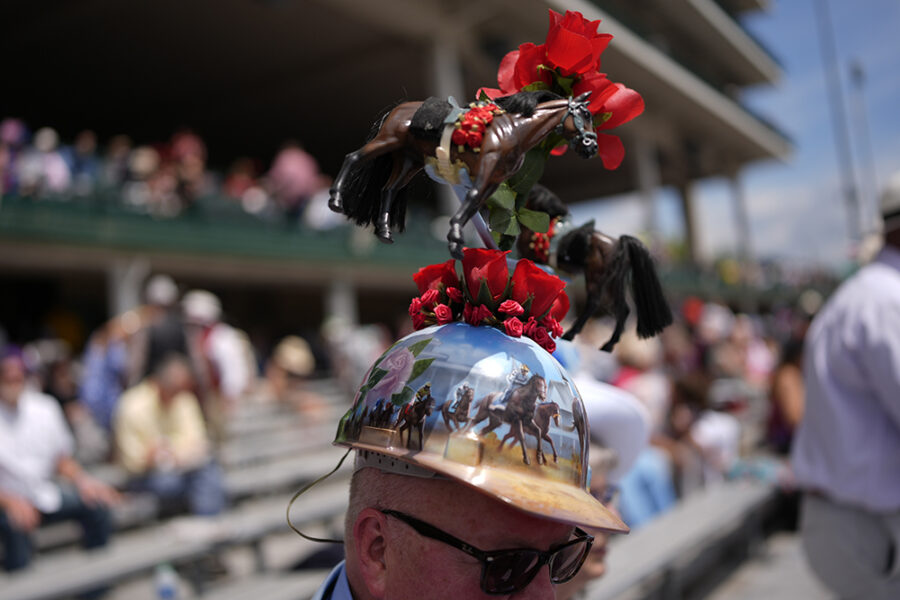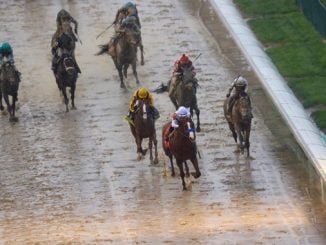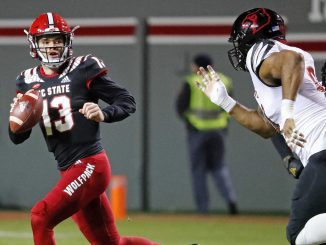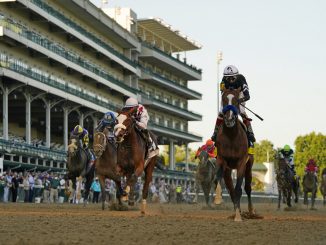LOUISVILLE, Ky. — When Lori Hennesy imagined her outfit for the 150th running of the Kentucky Derby, she wanted to create something deserving of that monumental anniversary, a celebration of Kentucky’s greatness and history.
So, she got a bucket of chicken, red and white striped with Colonel Sanders’ famous face on the front, filled it with roses and attached a plastic horse. She wore it on top of her head.
“I wanted to have fun,” she said. Hennesy reckons that is what this place has always been about and how it came to host the longest continuously held sporting event in America.
She imagines what Churchill Downs must have been at that first race on May 17, 1875, when Ulysses Grant was the president, the country was still reeling in the aftermath of the Civil War and patrons arrived to watch the horses by riding horses there themselves. Women required a male escort to attend, The Courier-Journal reported, and admission was as little as $1.
The 150th Run for the Roses would be unrecognizable to the 10,000 people who attended that first race at an unknown track on the rural outskirts of Louisville, Kentucky. Now more than 157,000 pack into Churchill Downs from all over the world for a days-long spectacle of huge hats and mint juleps, where most grandstand tickets cost more than $500 and celebrities celebrate in lavish suites high above the track.
But Hennesy suspects that the vibe back then would have been the same as today: People are there to see and be seen, to distract themselves from ordinary troubles and have a good time.
“I can imagine even then, it was just fun,” she said. “This day is magical.”

The sun was shining Saturday, and Derby-goers didn’t have to contend with the bad news that put a damper on the race last year, when seven horses died in the week leading into the race. They posed for pictures in front of a sign commemorating the anniversary and whispered about the celebrities who made an appearance.
Kentucky native Wynonna Judd was at the track to sing the National Anthem. Martha Stewart was the day’s grand marshal, charged with saying “Riders’ Up!” to start race. Travis Kelce, three-time Super Bowl champion and Taylor Swift’s boyfriend, comedian Jimmy Fallon and musician Kid Rock were also at the track.
Patrons jockeyed to watch the horses get saddled at the track’s renovated new paddock, now a massive horseshoe-shaped space at the foot of the famous Twin Spires.
Mary and Skip Keopnick weren’t sure they were going to like the changes, but they said they were pleasantly surprised. They have a room in their Michigan home devoted to the Derby that features old hats and memorabilia from their decades in attendance.
Skip Keopnick attended his first Derby in 1977 and hasn’t missed one since. In the years since, he has seen a lot change. Women have always worn big hats, he said, but the men have finally caught up, often sporting bright, patterned suit jackets.
He fashioned a helmet years ago — with a motor and a gear system — that spins two horses around the top of his head. For the 150th Derby, he said, he made the motor bigger and the gear taller so the plastic horses on his head could run around faster. His wife had a floor-length dress screen-printed to read “Kentucky Derby 150th.”
“It’s a milestone,” he said. “We had to do it up bigger than usual.”
Some in the stands came to commemorate their own milestones.
Charlotte Amsden turned 70 this year. She grew up with horses and always dreamed of watching them run at the world’s most famous race. She read that the Derby had special birthday of its own this year and called her daughters: “We have got to go celebrate my birth and the birth of the Derby,” she said.
She came with three generations: her three daughters, her granddaughter, a grandson, her great-granddaughter, just 4 months old, who had to have her own ticket to get into the racetrack.
Amsden got choked up at the idea that maybe, 50 years from now, that little one will return to watch the 200th Derby.
“That would be so special,” she said.
And she wondered: What would this place look like then?



